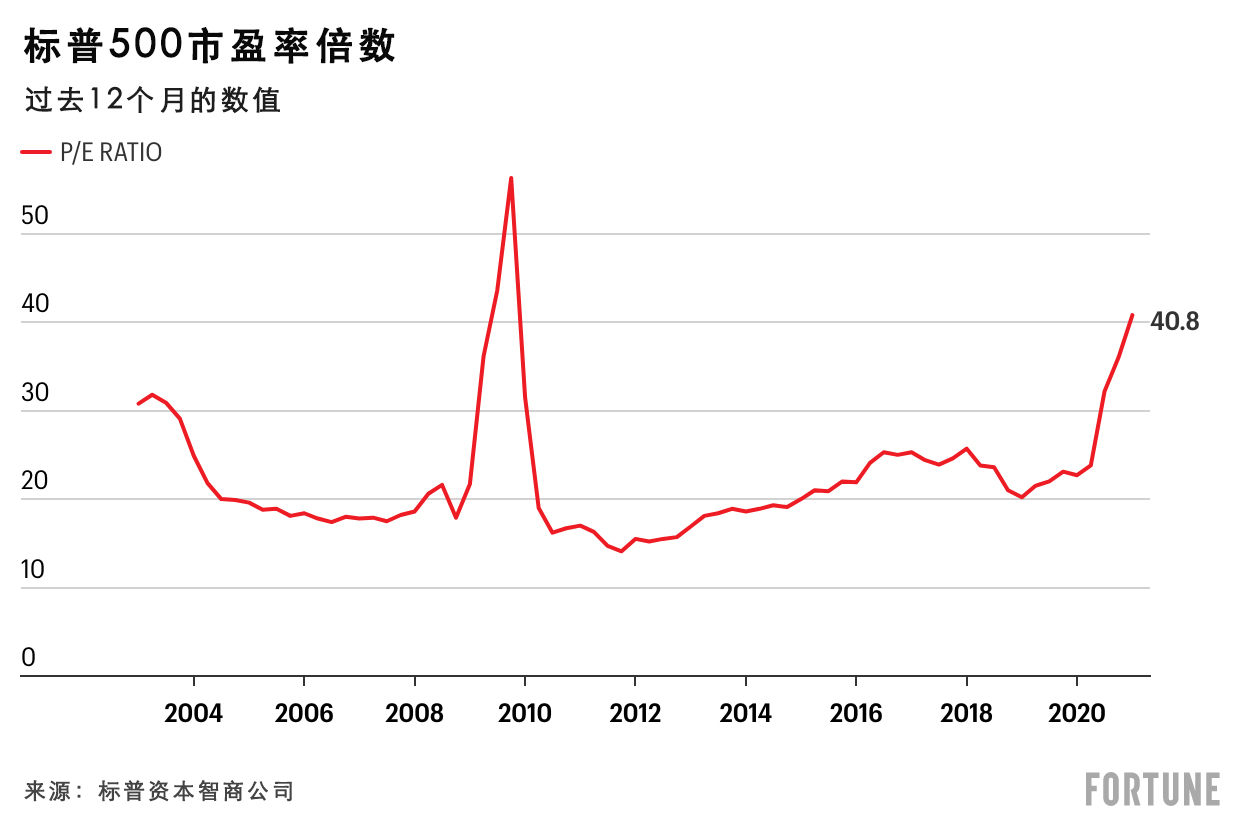它被誉为“永恒之王”。然而这里指的并非是怀特那本有关亚瑟王的书作,而是现金。
一些精明的投资者正重提“现金为王”这个术语。他们加大了对这款最保守投资工具的押注,并准备在这个他们看来市场过热、未来扑朔迷离的时期,欣然把握其带来的各种机遇。
到底该持有多少现金?
英联邦金融网(Commonwealth Financial Network)投资管理负责人布莱恩·普莱斯表示,在这一方面,金融顾问通常都奉行一条金科玉律:以现金的形式持有3-6个月的费用,并将其作为应急资金,同时保留足够的“近期流动性”,来支付同一时期可预见的费用。
佛罗里达海湾海岸大学金融学教授汤姆·斯迈思表示:“对于我来说,正常市场中的现金基本上就是交易、应急资金,差不多就是这样。人们98%的资产组合可能都是股票和债券”,现金只占2%。
当前的市场并不正常。标普Capital IQ的数据显示,标普500市盈率倍数达到了数年来的第二高位。

这一现象导致一些人改变了其推荐。斯迈思说:“我想说的是,人们如今可能会让现金的占比达到5%-10%。New York Life Investments多资产投资组合策略师劳伦·古德温表示,“通常,投资者希望在预期的市场回挫过程中构建其现金头寸。”她指出,这里还存在大量的不确定性。
NEPC合伙人兼私人财富团队领导人卡伦·哈丁表示:“我们认为,如今可能的结果范围要比以往更加宽泛。我担心的是,股票价格的上升会导致抛售。”哈丁说,现金则能够成为“抄底”行为的“灭火器”。例如,如果标普500的跌幅超过30%,就像其在2020年2月19日至3月23日那样,投资者可能会大量购买最终有望再次上扬的股票。
Per Stirling Capital Management财富与资产组合管理公司总监罗伯特·菲普斯III表示:“如今市场上存在着海量的杠杆。我确实认为[债券]利率正处于上扬阶段,而且通胀也在增长。如果FAANG[主流科技公司]股票因利率的提升而受挫,那么指数投资者获得可观回报的难度就会更大。”
菲普斯将其公司的资产组合现金占比提升至反常的30%,以便能够在动荡环境下迅速进行资金部署。“当有很大的机会获得高风险调整后回报时,我希望拥有大量的风险敞口。”他将目光瞄向了周期股以及价值股,这些股票“在比较增长方面看起来比我投资历史上的任何时期都要好。”
避免割肉
对于大多数投资者来说,通过抛售现有股票来套取利润然后变现的操作可能是不明智的。这里不仅涉及资本收益税,同时对于长线投资者来说,即便市场上存在抛售,股票价格也有可能最终会回归当前的水平。与此同时,即便你预见到了抛售,但完美地掌握这一市场时机几乎是不可能的事情。Wealthspire Advisors董事总经理阿维瓦·品托称:“就像是用手接下落的刀一样。你可能会在市场下跌的时候买入,或在市场依然上扬时出售。”
然而在现金为王的策略之下,像股息、收益分配和额外储蓄这样的新资金可以进入你的经纪结算账户,然后在自己重新平衡资产组合时使用,例如销售亏损资产、购买更有潜力的资产等,从而确保获得最佳业绩。
此外,将新资金以现金形式留存“能够让我们在重新平衡资产时无需销售应税账户的头寸,这样便可避免不利的税收费用。”
现金也有不足之处:通胀。随着价格逐渐提升,现金的价值就会下跌,除非将现金放在一个利率能够跑赢通胀的账户中,但较高的储蓄利率如今远低于1%,因此通胀会蚕食掉你的资产。
在正常时期,很多现金都会流向固定收益资产,并作为对持有股票的平衡手段。然而,不管当前的价值如何,那些资产组合中原本应该比较“安全”的部分所产生的收益也都是乏善可陈。固定收益和现金之间的表现差异是如此之低,以至于“基本上没什么收益”,哈丁说道。
然而,有鉴于股价处于或接近历史新高,而且很多人预测股价终究会走下神坛,因此持有现金确实会为你提供押注终极逆势的能力:如果股市一蹶不振,当其他人在恐慌抛售时,你却已然为抄底做好了准备。(财富中文网)
译者:冯丰
审校:夏林
它被誉为“永恒之王”。然而这里指的并非是怀特那本有关亚瑟王的书作,而是现金。
一些精明的投资者正重提“现金为王”这个术语。他们加大了对这款最保守投资工具的押注,并准备在这个他们看来市场过热、未来扑朔迷离的时期,欣然把握其带来的各种机遇。
到底该持有多少现金?
英联邦金融网(Commonwealth Financial Network)投资管理负责人布莱恩·普莱斯表示,在这一方面,金融顾问通常都奉行一条金科玉律:以现金的形式持有3-6个月的费用,并将其作为应急资金,同时保留足够的“近期流动性”,来支付同一时期可预见的费用。
佛罗里达海湾海岸大学金融学教授汤姆·斯迈思表示:“对于我来说,正常市场中的现金基本上就是交易、应急资金,差不多就是这样。人们98%的资产组合可能都是股票和债券”,现金只占2%。
当前的市场并不正常。标普Capital IQ的数据显示,标普500市盈率倍数达到了数年来的第二高位。
这一现象导致一些人改变了其推荐。斯迈思说:“我想说的是,人们如今可能会让现金的占比达到5%-10%。New York Life Investments多资产投资组合策略师劳伦·古德温表示,“通常,投资者希望在预期的市场回挫过程中构建其现金头寸。”她指出,这里还存在大量的不确定性。
NEPC合伙人兼私人财富团队领导人卡伦·哈丁表示:“我们认为,如今可能的结果范围要比以往更加宽泛。我担心的是,股票价格的上升会导致抛售。”哈丁说,现金则能够成为“抄底”行为的“灭火器”。例如,如果标普500的跌幅超过30%,就像其在2020年2月19日至3月23日那样,投资者可能会大量购买最终有望再次上扬的股票。
Per Stirling Capital Management财富与资产组合管理公司总监罗伯特·菲普斯III表示:“如今市场上存在着海量的杠杆。我确实认为[债券]利率正处于上扬阶段,而且通胀也在增长。如果FAANG[主流科技公司]股票因利率的提升而受挫,那么指数投资者获得可观回报的难度就会更大。”
菲普斯将其公司的资产组合现金占比提升至反常的30%,以便能够在动荡环境下迅速进行资金部署。“当有很大的机会获得高风险调整后回报时,我希望拥有大量的风险敞口。”他将目光瞄向了周期股以及价值股,这些股票“在比较增长方面看起来比我投资历史上的任何时期都要好。”
避免割肉
对于大多数投资者来说,通过抛售现有股票来套取利润然后变现的操作可能是不明智的。这里不仅涉及资本收益税,同时对于长线投资者来说,即便市场上存在抛售,股票价格也有可能最终会回归当前的水平。与此同时,即便你预见到了抛售,但完美地掌握这一市场时机几乎是不可能的事情。Wealthspire Advisors董事总经理阿维瓦·品托称:“就像是用手接下落的刀一样。你可能会在市场下跌的时候买入,或在市场依然上扬时出售。”
然而在现金为王的策略之下,像股息、收益分配和额外储蓄这样的新资金可以进入你的经纪结算账户,然后在自己重新平衡资产组合时使用,例如销售亏损资产、购买更有潜力的资产等,从而确保获得最佳业绩。
此外,将新资金以现金形式留存“能够让我们在重新平衡资产时无需销售应税账户的头寸,这样便可避免不利的税收费用。”
现金也有不足之处:通胀。随着价格逐渐提升,现金的价值就会下跌,除非将现金放在一个利率能够跑赢通胀的账户中,但较高的储蓄利率如今远低于1%,因此通胀会蚕食掉你的资产。
在正常时期,很多现金都会流向固定收益资产,并作为对持有股票的平衡手段。然而,不管当前的价值如何,那些资产组合中原本应该比较“安全”的部分所产生的收益也都是乏善可陈。固定收益和现金之间的表现差异是如此之低,以至于“基本上没什么收益”,哈丁说道。
然而,有鉴于股价处于或接近历史新高,而且很多人预测股价终究会走下神坛,因此持有现金确实会为你提供押注终极逆势的能力:如果股市一蹶不振,当其他人在恐慌抛售时,你却已然为抄底做好了准备。(财富中文网)
译者:冯丰
审校:夏林
Call it “The Once and Future King.” Not T.H. White’s book about Arthur, but cash.
For some savvy investors, the phrase “cash is king” has made a comeback. They’re ramping up a bet on the staidest investment of all, getting ready to pounce on opportunities at a time when they see overheated markets, and uncertainty ahead. The move is bold and can offer strong advantages if done right.
How much cash should you carry?
Financial advisers traditionally have a rule of thumb: Keep three to six months of expenses in cash as an emergency fund as well as enough “near-term liquidity” to cover foreseeable expenses over the same period, says Brian Price, head of investment management at Commonwealth Financial Network.
“For me, basically cash in a normal market is transactions, emergency fund, and that’s about it,” says Tom Smythe, professor of finance at Florida Gulf Coast University. “Probably, 98% of your portfolio is in stocks and bonds,” leaving 2% in cash.
But current markets aren’t normal. The S&P 500’s P/E multiple is the second highest it has been in many years, according to data from S&P Capital IQ.
That's leading some to alter their recommendations. “I would say you’d probably want 5% to 10% in cash now,” Smythe says. “Typically, investors want to build their cash positions in times of anticipated market drawdowns,” adds Lauren Goodwin, a multi-asset portfolio strategist at New York Life Investments. There’s also a lot of uncertainty, she notes.
“The potential range of outcomes today we believe is wider than usual,” echoes Karen Harding, a partner and private wealth team leader at NEPC. “I am afraid equities are expensive and going to sell off.” Cash offers the “dry powder” to bargain hunt, Harding says. If the S&P 500 dropped more than 30% as, for example, it did between Feb. 19 and March 23 in 2020, an investor could load up on stocks that will likely eventually head up again.
“We have incredible amounts of leverage in the markets right now,” said Robert S. Phipps III, director at wealth and portfolio management firm Per Stirling Capital Management. “I do think [bond] rates are headed higher. I do think inflation is headed higher. If the FAANG [major tech] stocks are hurt in higher rates, it will be harder for index investors to get a good return.”
Phipps upped his firm’s portfolio cash allotment to an unusual 30% for quick allocation in turbulent conditions. “I want to have a lot of risk exposure when there is a strong availability of high risk-adjusted returns.” He’s eyeing cyclicals as well as value stocks, which “look better now for comparative growth than any time in my investing history.”
Avoid getting nicked
For most investors, selling off existing equities to take a profit and put the money into cash is probably unwise. Not only is there tax on capital gains, but for long-term investors even if there is a selloff shares are likely to eventually return to current levels. Meanwhile even if you foresee a selloff, timing the market perfectly is nearly impossible. “It could be like catching a falling knife,” said Aviva Pinto, managing director of Wealthspire Advisors. “You may be buying in while the market is falling” or selling shares while there’s still an upside.
Under a cash-is-king strategy, however, new money like dividends, distributions, and additional savings could go into your brokerage settlement account for the times you rebalance your portfolio—selling losers, buying assets with more potential—to ensure optimum performance.
Plus, having new money stay in cash “allows us to rebalance without having to sell positions in taxable accounts, thus avoiding unfavorable tax liabilities,” said Sam Brownell of Stratus Wealth Advisors.
There is a downside of cash: inflation. As prices generally go up, the value of money falls. Unless cash is parked in an account that offered an interest rate higher than inflation—high savings interest rates are well below 1%—inflation will eat away at your asset.
In more normal times, much of the cash would go into fixed-income assets to balance equities holdings. But yields on what is supposed to be the “safe” part of a portfolio, generating income no matter what the current value might be, are hardly impressive. The difference in performance between fixed income and cash is so low that “it’s basically a wash,” Harding said.
But with prices at or near historic highs, and many predicting they'll come back to earth, cash does offer the ultimate contrarian bet: If stocks swoon, you'll be poised to buy when everyone else is panic selling.






